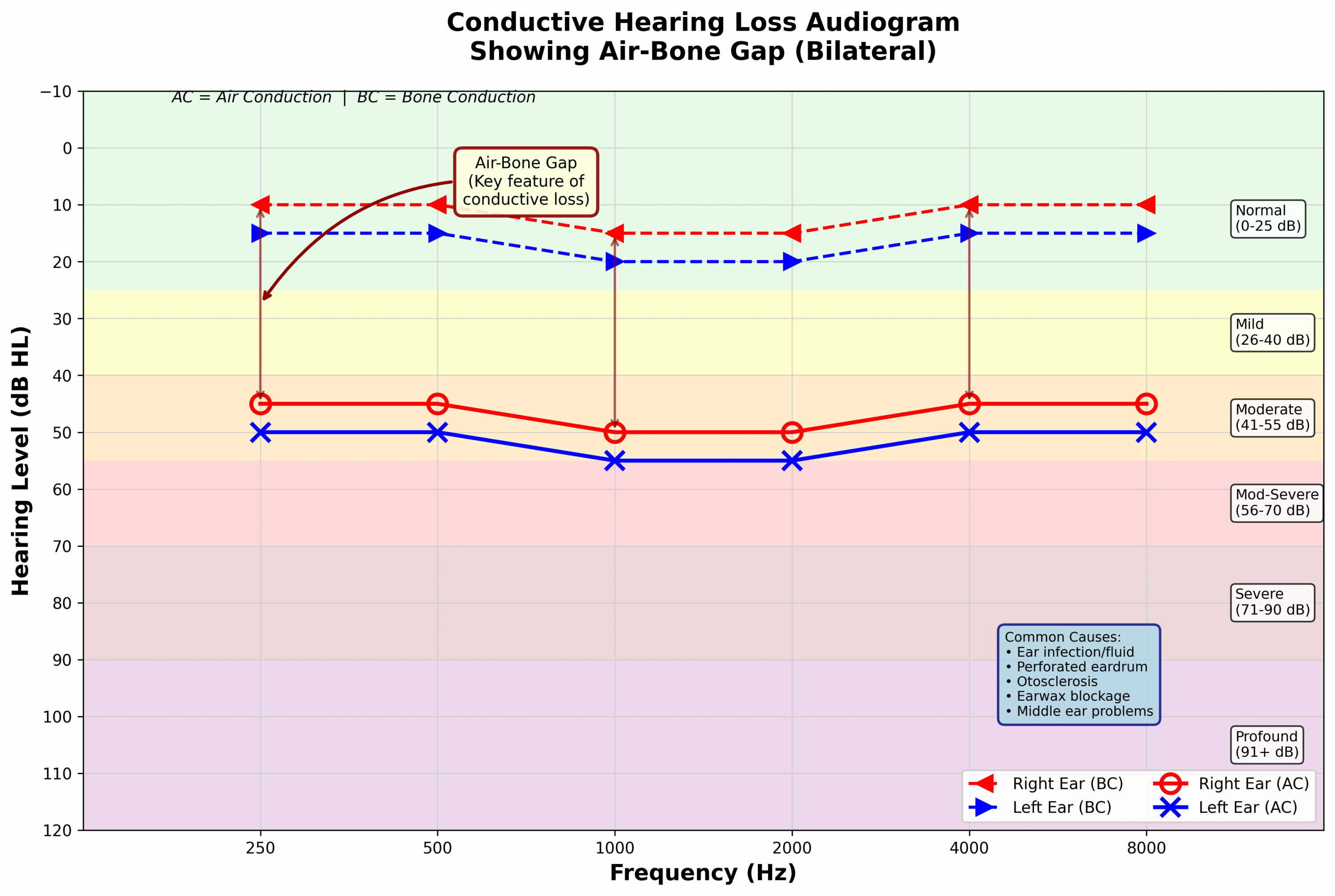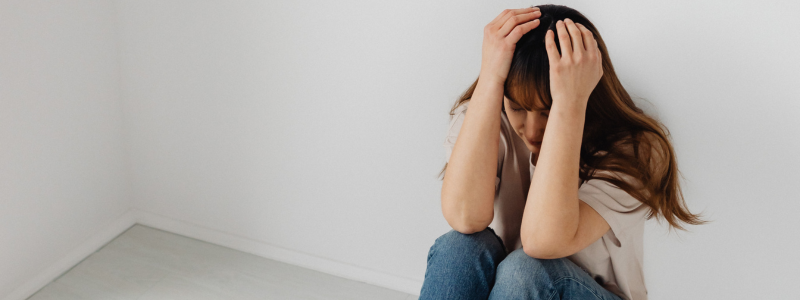
Head of Online Medical Content

Audiology Expert

Hearing aids for conductive hearing loss
A brief look into hearing aids for conductive hearing loss, such as bone conduction hearing aids
Overview | What is conductive hearing loss? | Hearing aids for conductive hearing loss | Conclusion
Last Hearing Aid UK Update:
Hearing aids for conductive hearing loss overview
Hearing aids for conductive hearing loss increase sound volume to bypass obstructions in the outer or middle ear. These devices help overcome issues like ear infections, fluid buildup, or malformations.
Styles include Behind-the-Ear and bone-conduction hearing aids, which transmit sound vibrations directly to the inner ear for improved hearing.
In this article, we explore the causes and symptoms of conductive hearing loss and the technologies and innovations behind hearing aids designed to improve hearing experiences for those facing this particular type of hearing loss.
What is conductive hearing loss?
Among the different kinds of hearing loss, conductive hearing loss has its own set of unique difficulties. Fortunately, progress in audiology has led to the development of specialised hearing aids that cater to the particular requirements of people with conductive hearing loss.
Conductive hearing loss is characterised by difficulties in sound transmission through the outer or middle ear.
Unlike sensorineural hearing loss, which involves damage to the inner ear or auditory nerve, conductive hearing loss typically develops with issues in the ear canal, eardrum, or middle ear.
The common causes of conductive hearing loss include ear infections, fluid accumulation, earwax blockages, or abnormalities in the ear's structure. Sometimes this type of hearing loss can be temporary (for instance, in the case of fluid from an ear infection), while in other cases, the issue is long-term or structural.

Can you get hearing aids for conductive hearing loss?
Are hearing aids used for conductive hearing loss? Yes, those with conductive hearing loss often experience a reduction in sound volume, unclear sounds, and difficulty hearing faint or faraway sounds.
Traditional hearing aids designed for sensorineural hearing loss may not be as effective in targeting the particular difficulties presented by conductive hearing loss.
Therefore, unique solutions have been designed to improve sound transmission and increase overall hearing for those with conductive hearing loss.

Special Hearing Aids for Conductive Hearing Loss
Can hearing aids be used for conductive hearing loss?
What are the different types of hearing aids for conductive hearing loss?
Bone conduction hearing aids: One solution for conductive hearing loss is bone conduction technology. In contrast to conventional hearing aids that increase sounds through the ear canal, bone conduction hearing aids bypass the outer and middle ear entirely.
These hearing aids work by transmitting sound vibrations directly to the inner ear via the bones of the skull.
A bone conduction hearing aid typically consists of a small device placed on the bone behind the ear. This device sends vibrations through the bone, stimulating the inner ear and allowing those with conductive hearing loss to hear sounds more clearly.
Contralateral Routing of Signals (CROS) and BICROS hearing aids: For those with conductive hearing loss in one ear, CROS and BICROS hearing aids offer effective solutions. CROS systems involve placing a microphone on the impaired ear and transmitting the sound to the better-hearing ear.
This helps people perceive sounds from both sides, improving directional hearing and overall hearing experience.
BiCROS, on the other hand, uses two microphones, one on each ear, to enhance the reception of sounds. This technology supports conductive hearing loss in both ears, allowing them to better engage in conversations and hear sounds from various directions.
Bone-anchored hearing aids (BAHA) hearing aids: These provide an alternative for those with conductive hearing loss caused by issues in the middle ear, such as chronic ear infections or malformations.
BAHA involves surgically implanting a small device into the bone behind the ear, which then transmits vibrations directly to the inner ear.
This bypasses the damaged middle ear components, delivering a more direct pathway for sound conduction.
Benefits of wearing conductive hearing aids
Wearing hearing aids for conductive hearing loss offers many benefits and significantly improves daily life. These devices boost sound transmission through the outer or middle ear, tackling problems such as ear infections, fluid buildup, or structural abnormalities.
By increasing the volume of and clarifying sounds, hearing aids restore reduced auditory capabilities, facilitating clearer conversations and reducing social isolation.
What are the best hearing aids for conductive hearing loss?
Hearing aids for conductive hearing loss have undergone major progress, providing a variety of choices to address the specific difficulties encountered by individuals with issues in the outer or middle ear.
From bone conduction technology to unique systems like CROS and BAHA, such devices have transformed the lives of many, supplying advanced hearing experiences and improved quality of life.
With ongoing technological progress, the future holds even more promise for those with conductive hearing loss.
Active investigation and innovation in the field of audiology aspire to optimise existing technologies and launch new solutions, ultimately guaranteeing that everyone, regardless of their hearing challenges, can completely engage in the world of sound.
Exploring implantable devices with an audiologist or ENT specialist can open up possibilities that standard hearing aids might not provide.
Key takeaways
- Conductive hearing loss happens when sound has trouble getting through the outer or middle ear, frequently caused by issues like infections, fluid buildup, wax blockages, or structural problems.
- Standard hearing aids designed for inner-ear (sensorineural) loss might not always work well for conductive loss, because the sound transmission pathway is different. Specialised hearing aids are available:
- Bone-conduction devices bypass the outer and middle ear by sending sound vibrations directly through the skull bones to the inner ear.
- Bone-anchored hearing aids (BAHA) involve a small implant that transmits these vibrations more directly.
- CROS / BiCROS systems can help when one or both ears are affected: sound from the weaker ear is picked up and routed to the hearing ear(s).
- These devices can greatly improve hearing, making sound clearer, louder, and more accessible — helping people hear in daily life and reducing social isolation.
- There’s no one-size-fits-all “best” hearing aid: the right solution depends on the person’s specific type and severity of conductive hearing loss.
- Newer audiology technologies are continuing to evolve, offering more refined and effective devices to resolve the challenges of conductive loss.
- It’s important to get assessed by an audiologist or ENT specialist, because medical or surgical treatment might also be an option, depending on what's causing the conductive impairment.
Why Choose Us?
- FREE Hearing Tests
- Best Hearing Aids and Prices
- FREE Aftercare for Life
- FREE Home Visits
- 200+ Local Audiologists
- 60 Day Money Back Guarantee
Are hearing aids good for conductive hearing loss?
Hearing aids can help with conductive hearing loss. We don't offer bone-conduction hearing aids or bone-anchored hearing aids, but we do have CROS and BICROS solutions available. However, if you think you may have conductive hearing loss, you must book an appointment with your local GP.
They will then refer you to your ENT department or an audiologist in your area. Your audiologist will decide the best solution for your hearing loss and develop a future hearing healthcare plan accordingly.
Other hearing loss awareness articles you might like...
 Hearing aid stigma
Hearing aid stigma  The impact of diet on your hearing
The impact of diet on your hearing  How to tell if hearing loss is permanent or temporary
How to tell if hearing loss is permanent or temporary Our specialist service includes:
Do not spend hundreds of pounds without getting a second opinion from us.
Please call us on 0800 567 7621
 Not only are the prices great, but the service is fantastic! Many thanks to your team.
Not only are the prices great, but the service is fantastic! Many thanks to your team.What's included in our hearing aid prices?
Common FAQs about hearing aids for conductive hearing loss
Can I use a hearing aid with conductive hearing loss?
Hearing aids offer effective treatment options. These include air-conduction hearing aids, bone-conduction hearing aids, and bone-anchored hearing aids.
Do you need hearing aids for mild conductive hearing loss?
Even with mild hearing loss, a hearing aid can provide significant benefits. It helps capture sounds that may be missed and can potentially prevent further deterioration of hearing.
Can conductive hearing loss be reversed?
Conductive hearing loss is less common. It's caused by an obstruction or other abnormality in your outer or middle ear, preventing sound waves from traveling through. Conductive hearing loss can be either permanent or temporary, and in some cases, it can be cured completely.
Other pages you might find useful
Ask the Experts
6 Morton Lane
Walkwood
Redditch
Worcestershire
B97 5QA
Latest Launch
When we refer to a product as 'Latest Launch', we mean it is the latest to be released on the market.
New
When we refer to a product as 'New', we mean that the product is the newest hearing aid model on the market.
When we refer to a product as 'Superseded', we mean that there is a newer range available which replaces and improves on this product.
Older Model
When we refer to a product as an 'Older Model', we mean that it is has been superseded by at least two more recent hearing aid ranges.
